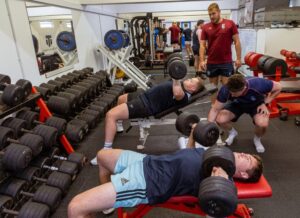Sleep and Technology are in, too much sitting down is out…” Sir Dave Brailsford, Team Sky Cycling. 2015
Sleep is big in performance environments and it should be high up on your priority list too. Lack of sleep can lead to;
decreased motivation, focus, endurance, muscle recovery, tissue repair, power whilst increasing perceived effort, depression, anxiety, reaction times, as well as a number of other significant behaviours and processes vital for rugby players to perform at their best.
With poor sleep we miss out on a number of vital restorative processes that allow us to hit a physiological and emotional reset button. The endocrine system has a complex response to sleep, secretion of a number of hormones are up or down regulated during sleep. Secretion of growth hormone that is responsible (in part with others) for growth, cell reproduction and regeneration is up regulated during sleep. A key hormone in facilitation of post training adaptations! Hormones that aid and work with growth hormone and support immune function are also up regulated during sleep.
Cortisol, as opposed to Growth Hormone is a key stress hormone and is down regulated during sleep. Cortisol has been shown to weaken the activity of the immune system, inhibits peripheral utilisation of glucose (a key feature of type 2 diabetes) and down regulates the synthesis of collagen – the building blocks of the tissues in our body. Compare this to the function of growth hormone, and you can see why this balance during sleep is essential for adaptation to training and keeping the body in a state of equilibrium and health. The link between sleep and endocrine function is becoming better understood and adults who report having 5 hours or less each night are 2.5 times more likely to develop diabetes and collegiate athletes that report getting less than the 8 hours of recommended sleep consistently can be up to twice as likely to suffer injuries.
Sleep it’s safe to say, does not take a lot of conscious effort (planning and implementing good sleep habits on the other hand does!). But once you are actually asleep the conscious element disappears. That does not mean that there aren’t a number of vital processes taking place. These processes are the ones that don’t have room to take place when the body is in a wakened state. The body can only deal with a limited number of roles and responsibilities, and, in the working, waking day and these take priority over functions that can be completed once our driven behaviours, whether these are work or recreation have been completed.
Phases of Sleep
When we sleep we pass through 5 stages of sleep, stages 1-4 and REM (rapid eye movement). A complete cycle takes 90-110 minutes and as you progress through a full nights sleep the time in each stage also changes. Over a full nights sleep we will spend approximately; 20% in phases 1, 3 & 4, 50% in stage 2 and 20% in REM sleep. The first phase of REM sleep typically occurs around 70-90minutes after the onset of sleep and is relatively short before returning to phase one. As we move through repeated cycles of sleep the balance will shift towards longer time in REM sleep and less time in phases 3&4. The key features of each stage of sleep are shown below.
The picture below shows the phases of sleep as we move through a nights sleep. Typically depressants and sleep ‘aids’ like alcohol or medications interrupt the phases of sleep. So although with these ‘aids’ you may well fall to sleep easier and sleep for longer it will be of poor quality and using these aids should not be seen as a long term solution for poor sleep.
(image from endyoursleepdeprivation.com)
If we fail to achieve the optimal amount of sleep or the sleep we have is poor quality then a number of physical and cognitive functions can become impaired. A number of these are shown in the table below.It is clear that any combination of the factors above could severely hinder performance. Getting good sleep is something to be invested in.
Whether your goals are weight loss, improved performance at work or in training, lack of sleep will limit how successful you are in achieving them.
Sleep Deprivation and its Impact
So how much sleep do we need?
This changes as we age and studies have recommended the following (Hirshkowitz, M. 2015);
The optimal amount of sleep varies from person to person and the study above made no concrete recommendations on how much sleep any one person should get. It is important to remember that with increased physical and mental demands the required amount of sleep needed will increase. This is especially important to remember if you regularly have high physical and cognitive tasks to complete. If the increased demand for sleep cannot be met at the end of the day then napping can be extremely beneficial and a way of getting the cumulative sleep and recovery time needed.
Circadian Rhythm
Our bodies are regulated by an internal body clock. It’s what gets thrown out of line when we cross time zones and manifests itself as jet lag. This body clock is operated by and controlled by a number of processes and makes up our circadian rhythm – how awake or asleep we are through a 24 hour cycle. Our circadian rhythm is controlled by a combination of environmental cues ‘Process C’ and internal homeostatic cues ‘Process H’. Process C would include the Zeitgebers like the light, temperature, smell of the environment were are in. Process H would include things like how long had passed since we last slept, the importance of this is that we operate at our best at different times of the day. Typically peak alertness happens around late afternoon/early evening. It is the process H cues from our environment that can become very confusing to the body if we don’t have a consistent sleep habit.
Like with most things there is a large variation from person to person in how their internal circadian rhythm operates and we already inadvertently recognize which sleep chronotype an individual fits into. We label people ‘morning people’, ‘early birds’ or ‘night owls’. Which chronotype you fit into can significantly affect when you will be most likely to perform at your best. Early birds will struggle with tasks later in the day just as night owls will struggle in the earlier hours.
Monitoring your sleep
There are a vast number of fitness apps already on to the market. A significant number claim to be able to monitor sleep and some even claim to monitor the phase of sleep you are in (phases of sleep will be looked at in more detail in later posts). At the time of writing most of these devices have had mixed results when compared to research gold standards like polysomnography (PSG) that looks at brain activity, eye movements, muscle activity, heart rhythm and respiratory function. What these apps and activity trackers may be good for though is making you more aware of your sleep habits and hopefully making some positive changes to improve sleep. The quality of the data is always improving but you really don’t need to be reliant on technology to do something that your body is designed to do. I think one of the most effective sleep monitoring tools is shown in the picture below;
Keep it simple and keep an eye on the time. You know when it’s late, and you usually know when you need to get up. Once you are getting ready for sleep there a number of markers that are useful to keep track of. Drifting away from the ‘norm’ may be an indicator that your sleep habits need to be improved;
| Measure | ‘Normal’ Values |
| Sleep onset latency (time to fall asleep once in bed) | 10-20min |
| Sleep efficiency (time in bed actually asleep) | over 80% |
| Total time asleep (wide range of ‘normal values) | 8 hours |
Of particular importance are the measures of sleep latency and sleep efficiency. If you go to bed at an appropriate time but are unable to fall asleep relatively quickly your sleep pattern will still be poor. These are also easily influenced by your sleep routine.
Simple practices that are done consistently can play a big role in optimising function and in the case of athletes, performance. Hopefully some of the information here will help you be more aware of your sleep habits and make some positive changes if they’re not quite what they should be.
How you can get a good nights sleep
Getting a good nights sleep isn’t too difficult. Some times we just need to get out of our own way and break damaging habits that get in the way of our bodies in built instincts to rest and recover.
Sleep is instinctive but we live in a world full of stimulants. These can be in the form of bright screens, poorly designed sleep environments or chemicals that we ingest throughout the day. We have also know that emotional stress can negatively influence our sleep.
Keep things simple. The body is well adapted to respond to environmental cues that it is time for sleep – these are called zeitgebers (word of the day). The modern environment we now live in is very good at removing or masking these cues.
Here are our top 5 tips on how to guarantee yourself a good nights sleep allowing you to wake up recharged and refreshed!
- Go to bed at an appropriate time. The simplest habit of all! Plan when you’ll need to be up, plan in the appropriate amount of sleep. And stick to it!
- Create a sleep routine. Your body needs to know when it can enter a state of rest. The more consistent this is, the more likely you are to have regular high quality sleep. This will align with your natural circadian rhythm and sleep chronotype.
- Create a good sleeping environment. Make your sleeping environment comfortable, cool and dark. Avoid using the bedroom as a second living room, office or even dining room. The body releases melatonin when it enters a dark environment to start preparing itself for sleep and the limbic system responds to zeitgebers at an emotional and physiological level.
- Limit use of light emitting displays. This means your phone, TV, tablet etc. late in the day, especially within 2 hours of when you know you’ll go to bed. I know a seemingly impossible and unreasonable request. But, light emitted from these devices, especially blue light trigger the brain to enter or stay in a wakened state. A number of apps are now available that cause your devices to emit red light in line with dawn and dusk hours allowing you to limit the impact of blue light as you prepare for sleep. Remember though, the activities you use your devices for will have a significant impact on whether your mind can relax and prepare for rest! For your mind to switch off you need to give it the opportunity to do so. Don’t check those final voicemails, emails, social media. Set it aside, turn the device off to stop it disturbing you with the latest offers and deals in the early hours, they can wait!
- Avoid caffeine and stimulants late in the day. Caffeine has a half life of 5.7 hours so dependent on the quantity ingested you could still be feeling the physiological effects hours after your last drink. Also avoid alcohol. Alcohol acts as a depressant it can help you fall asleep initially but overall makes sleep more fragmented and less restorative.






